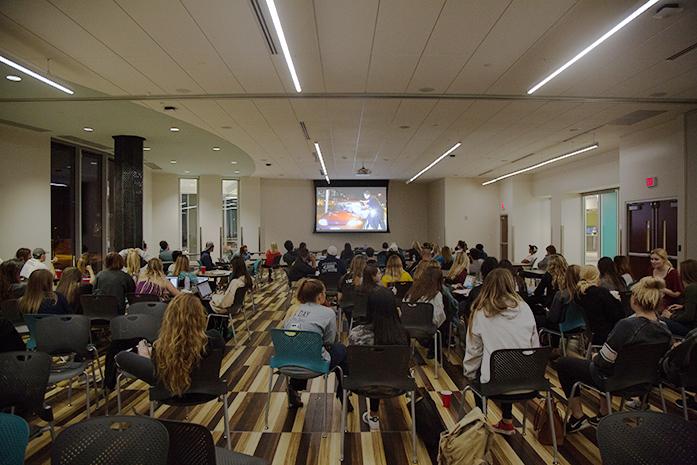By Naomi Hofferber
naomi-hofferber@uiowa.edu
A crowded room of University of Iowa students watched as, on screen, a police officer handcuffed a young man across the hood of his car. “You can’t win that game on the street, where they’re king,” the video stated in a voiceover, encouraging viewers not to provoke the police.
UI Student Legal Services, Associated Residence Halls, and the Center for Diversity and Enrichment hosted an event about personal rights and police interactions at the Petersen Residence Hall on Monday night.
The event involved the showing of the film 10 Rules for Dealing with Police, which was produced by Flex Your Rights, a nonprofit organization with the goal of improving the constitutional literacy of American citizens.
The video walked through several scenarios in which individuals were placed in situations with the police where conflict escalates, then provided rules and solutions as well as legal rights that can be invoked during such as encounters.
There were 10 rules for police interaction: always be calm and cool, you have the right to remain silent, you have the right to refuse searches, don’t get tricked, determine if you’re free to go, don’t expose yourself, don’t run, never touch a cop, report misconduct, and you don’t have to let police in.
“We’re part of a society; the people who enforce the laws in society are the police, and any of us could have encounters with them at any time,” said Christopher Malloy, the director of Student Legal Services. “We all have constitutional rights that allow us to protect ourselves when we’re in those situations. We need to know how to properly assert them for them to be of any use.”
An overarching theme of the video was to treat the police respectfully but to be wary of “tricks” that can be utilized. The Fourth and Fifth Amendment rights were discussed, and viewers were reminded they have the right to refuse searches, refuse police access to homes if no warrant is present, and to persistently ask if they are free to go.
Kelly Mendez, who attended the event as part of the educational requirement for greek life, said you never know when you might have to interact with the police.
“I think that because there are not just city cops but also university cops, you never know when you might get stopped,” she said. “Its just really important if you’ve never been stopped before, and you’re by yourself in college, you don’t know how to deal with it. It’s just a good thing to know.”
UI junior Paul Rafac attended the event to fit the education requirement of the Advantage Iowa Scholarship and to learn more about his rights.
“There are a lot of issues with police and racial profiling and frisking, and just knowing your rights can’t hurt,” he said. “It’s important to know, living in America.”
Student Legal Services also holds an event each semester about renting and leasing contracts and provides services and consultations for around 1,000 students each year.
“Not everyone takes [the events] seriously, but I think they’re important to hold,” Rafac said. “It’s a university, and you’re supposed to learn. I think there’s value to it.”



